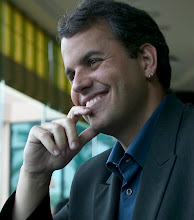On Friday I spent the day at a workshop sponsored by the MacArthur Foundation surfacing ideas on how to raise public consciousness around the United States’ financial future. With 10,000 baby boomers a day about to become eligible for Social Security, it is easy to understand the urgency policy experts feel around the issue. MacArthur brought together an amazing and eclectic group, even prying Ze loose from Color War, and generated a lively discussion around our perception of government, changing mental models, and what has been done so far.
Patrick Bresette, from the Demos Center for the Public Sector, reported finding from their 18-month study on how people talk about government. Their videos were striking – if you ask people “What do you think about government?” nearly everyone responded in the same way: cynical laughter followed by comments indicating lack of trust. Further interviews demonstrated that opinions about government are overwhelmingly driven by two factors. First, recent news dominates perception, so whatever politician did this week tends to be interpreted as what government is. Second, most people look at government from a “consumer stance” focusing on what “I want” and on government as “them”, a bureaucratic blob of exaggerated waste and bloat.
Researches surmised that reframing the discussion from a “citizen stance”, where government is a tool of the electorate -- government is “us” -- should enable a more productive discussion. They primed later surveys and focus groups with a brief paragraph that described the idea and benefits of common goods. They gave concrete examples of enduring systems and structures that help and protect people, although they didn’t actually mention government. The result was a dramatic change in discourse, where participants would bring up government and regulation in positive ways, reinforcing beneficial impacts in discussions with each other. When researchers tested how durable these new mental models were – through the social science equivalent of an extended game of telephone – the new, positive framing would survive through 7 or 8 generations.
This is, of course, a result you would expect from Communication 101. Moreover, this need to change mental models shows up repeatedly when attempting to address science education, where misapplied models end up reinforcing mistaken beliefs. It is important to investigate where mental models are dysfunctional, demonstrate their failure, cause people to practice with working models, and then to drive discussion that integrate these new, functioning models. In the case of how American’s think about our government, the Demos work suggests our tendency towards incorrect models hurt our ability to effectively think about problems, talk about government, and maintain an effective civil society.
I bring all this up not just because those findings are interesting, but because the lessons learned around interactions between governments and the electorate seem to apply quite well around two topics of great interest to me: building online communities and building companies.
Note that I’m not just talking about misapplying models to communities and organizations. Misapplications like using Dunbar’s research into primate social structure to determine organizational size or thinking about the corporations operating online communities as governments are interesting and likely deserve a separate post, but what about the consumer and citizen stances. How do they apply to communities and organizations? At their core, the consumer stance is about “me” and the citizen stance is about “us”, so consider how being stuck in a consumer stance can be damaging.
For a company, employees in a consumer stance are likely to respond to the question “how’s management doing?” with the government survey reaction of cynical laughter and lack of trust. Do I have to ask how most virtual world residents talk about the companies that run them?
In both cases, power disparities make finding workable models challenging, but the opportunity is there. Employees want to work for companies they are shaping. Community members want to improve their community. As executives, as community managers, it is critical to remember the need to provide constituents with working models to maximize effective communication and to work tirelessly to detect when we misapply our own models.
Sunday, March 23, 2008
models
Labels:
communities,
virtual worlds
Subscribe to:
Post Comments (Atom)

1 comment:
This was the most interesting post that I have read this morning. You managed to have me rethinking the innards of my vacuum cleaner and how I might apply what I had learned to the dynamics of a team. Nicely done.
I'd love to know where you got the idea to attend this type of workshop.
Post a Comment